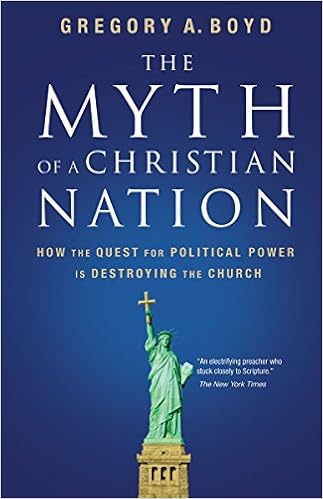
I couldn't have come across this book at a better time, as I am currently very distressed in regards to the church in relation to the political landscape in America, particularly in this election season. I loved the book for the most part, and I believe Boyd did a great job of exposing the horror that results when the church gets too involved in politics and loses sight of the other-worldly way in which the Kingdom of God is meant to function. For the most part he makes good points and presents challenging questions. I admire any pastor who is willing to allow 20 percent of their congregation to walk away before compromising his convictions.
However, as other reviews here have said, Boyd blurrs the lines between church and state too much in several places, and the perfect example is in his horrid commentary on Christians in relation to violence. I found myself cheering throughout the whole book until this last chapter, during which, in my opinion, the book took a nose dive and went into a tail-spin. He goes as far as to say Christians should not participate in the military, and essentially says its morally wrong in a roundabout way (and, being consistent, I would assume he also means police and any other government office where violent force may be used?) I personally take offense to that, as I have family members who lost their lives in the military while fighting to protect those around them. Moreover, the only way his model on Christian "non-violence" would work is if large numbers of people avoided becoming Christ followers for the purpose of having police and military. The funny thing is Boyd wouldn't even have the ability to preach or write any of his books if it hadn't been for the police and military using force at some point in the past. Thirdly, in earlier chapters he takes no issue with the "morning after" pill, and seems to suggest that abortions can be morally acceptable as the "lesser" of two evils, depending on the situation. However, it is the pinnacle of hypocrisy to argue that abortions or the morning after pill can be acceptable at times, but then turn around and condemn all police and military "violence" as if it is unquestionably condemned in Scripture.
However, the greatest folly in Boyd's reasoning about violence is seen in examining Scripture itself. Scripture makes it clear that in a fallen and temporary world, there are capacities in which the government (not the church) is permitted to use force to maintain justice and order, and when Christians are in law enforcement or the military, they are acting in accordance with Scripture (Romans 13), contrary to Boyd's bizarre theology on that. The point Boyd misses here is that Christians working for the government (including police and military) are not necessarily trying to use their secular position to advance God's Kingdom in the wrong fashion, rather they are acting as civil servants using their God given authority to protect and serve. This is a Biblical model, whether we are comfortable with it or not, and I would expect Boyd and any other Christian who thinks otherwise to be out there lobbying to abolish the police and military, or at least warning then that they can never become true Christians unless they quit their jobs.
The fact of the matter is Jesus said nothing against the centurion for being in the military, and seeing as enlisting in the Roman Army was a common practice for those living in the Empire at the time, it's implausible that Paul or any of the apostles would never have spoken against the practice if Boyd's conclusions ars in fact true. The same errors are evident in his views on defending ones self and family. He gives a rather incoherent response to the question, but forgets that just as the government is permitted to use force at times, one is charged with caring and providing for his family, including providing protection to a certain extent.
I loved the book for the most part, but as the last chapter indicates, he seems to have compromised important truths and failed to rightly divide and interpret the Scriptures on a few issues, at least in my evaluation. Other than that, awesome job.
No comments:
Post a Comment